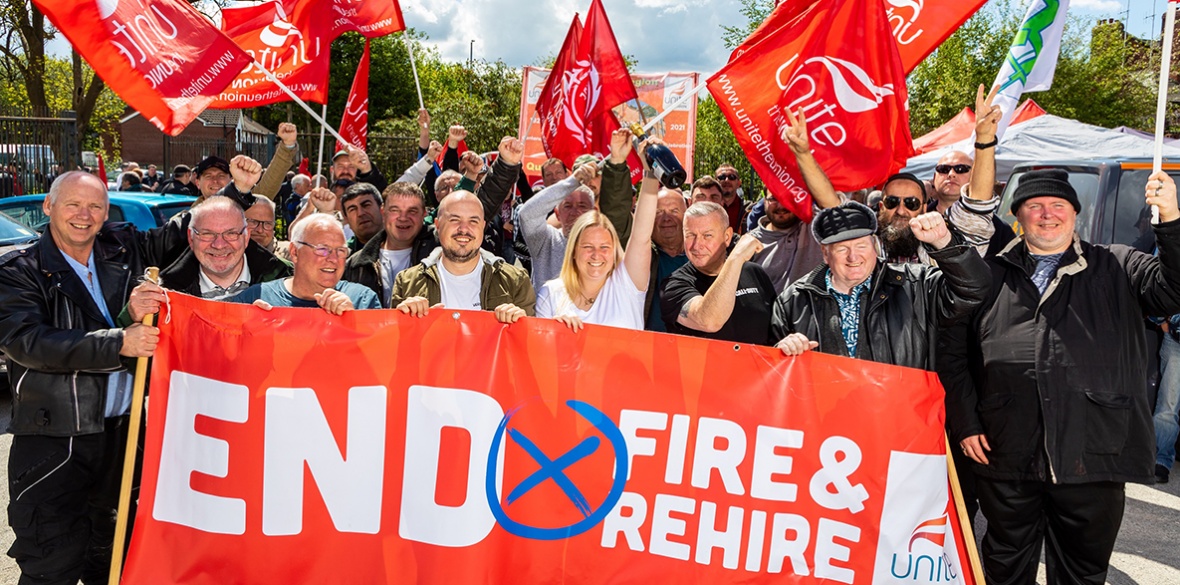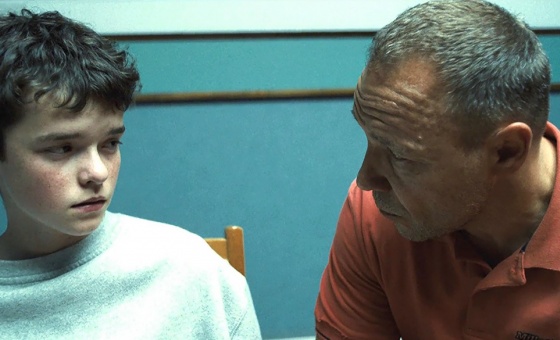This is the last article you can read this month
You can read more article this month
You can read more articles this month
Sorry your limit is up for this month
Reset on:
Please help support the Morning Star by subscribing here
WHEN 400 bus workers at the Queen’s Road depot of bus company Go North West in Manchester walked out on indefinite strike on February 28, they knew they were taking on an international transport conglomerate with huge power and wealth — the Go Ahead group.
This week, after 80 days on the picket line, they defied the apparent odds with victory after a struggle which could prove to be a blueprint for future fights against the abhorrent “fire and rehire” tactic being used by employers in the UK to attack the pay and conditions of 2.3 million workers.
Bosses introduced new contracts which did just that — cut pay, increased working hours, and demolished the drivers’ vital sick pay scheme, one of the most vital aspects of the company’s plan.
Colin Hayden is senior shop steward of Unite at the bus depot.
“You name it, it was in it,” he told the Morning Star in an exclusive interview on Tuesday. “Every single working practice was in it.
“The attack on sick pay was devastating. Long-serving drivers would lose £8-9,000 a year in sick pay entitlement — and that’s during a pandemic.
“They wanted an extra two hours on the working week, and they wanted to take away our break time.
“There would have been health problems, with drivers coming into work when they were ill because they couldn’t afford to take time off sick.”
The company announced its demands in March last year, just as the far-reaching implications of the coronavirus pandemic were being recognised in the UK. Two days later more than 60 per cent of the workforce was laid off — furloughed — as the government introduced its first lockdown against the spread of the Covid-19 virus.
Meetings of the workforce were of course banned.
Hayden said: “For weeks we explained to the company that we had no communication with the members. But they persisted in trying to get us to sign away our terms and conditions. All the way we resisted. We kept pushing them back.”
The depot’s Unite committee called in regional officials.
On August 14 the company instigated fire and rehire for all members.
With profits and cost-cutting the apparent motive behind the employer’s determination, Unite set up a working party to find efficiencies. From September to December it presented plans to reduce operating costs by between £1m and £1.3m a year, which it put to Go North West.
Hayden said: “It wasn’t enough for the company.”
In January the company said it would no longer negotiate.
“They did what we could only call as ‘drag in’ all the drivers for one-to-one meetings, denying them union representation and telling them they had seven days to sign the new contracts or otherwise they would be sacked,” said Hayden.
“You can imagine a lot of fear and desperation set into the drivers at this point. We immediately initiated an industrial action ballot. The company gave the drivers until February 9 to sign the new contracts. On the same day the ballot result was released and it was 82.3 per cent for strike action.
“We held two branch meetings and we agreed it would be continuous strike action. The strike started on Sunday, February 28.”
Preparations for a dispute had begun months earlier.
“Unite had set up a leverage team at national level,” said Hayden.
He said it was the team’s actions which “swung it in our direction.”
“They put pressure on the group, Go Ahead. The company was going for a big contract in Sweden. Politicians and trade unions were approached in Sweden. There were newspaper articles about Go Ahead and fire and rehire. Local authorities were alerted to what Go Ahead were doing in the UK — fire and rehire is illegal in Sweden.
“In Germany more pressure was applied on the same basis. Leverage was applied because they were chasing contracts there too.
“We had support from the International Transport Federation (ITF) and the European Transport Federation (ETF) unions. We started to apply pressure in Europe and further afield, speaking to trade unions abroad.
“We had support from Minnesota in the United States, from New Zealand where transport workers were on strike.
“When we heard about the ITF and the ETF it lifted morale.
“Go Ahead realised that it was under pressure from trade unions around the world, and that they would be damaged if they went down the road of fire and rehire.”
The leverage campaign was applied in Britain too.
“Go Ahead investors and shareholders were targeted as well. There was a huge campaign to get Andy Burnham and Sajid Javid (mayors of Greater Manchester and London) to outlaw fire and rehire.”
The two mayors want to take public bus transport back into public control — and will be awarding contracts if their plans succeed.
The Bradford headquarters of the West Yorkshire Pension Fund, which handles the pensions investments of five local authorities, was picketed because it has shares in Go Ahead. So were companies with dealings with Go Ahead, including suppliers.
But local solidarity was also vitally important to maintain the strikers’ morale.
“There was support from Manchester Trade Union Council and others all around the country including Reading and further afield down south,” said Hayden.
“There was the People’s Assembly, Better Buses for Manchester, Extinction Rebellion. They were all inspirational in backing the dispute, coming to the picket lines, taking part in the marches and rallies, in their hundreds and thousands. The Manchester labour movement sent out a motion asking councils to ban contracts with companies which use fire and rehire.”
And there were other, moving acts of solidarity, some of them from individuals.
“A local school gave us their play area for our tents and stuff. A mosque donated food. There was a disabled woman came down. She made her own biscuits. That motivates people.
“In terms of solidarity, you name it and we have had it.”
The company at national level broke.
“The company made new proposals at a meeting attended by Unite general secretary Len McCluskey and other officials with Go Ahead chief executive David Brown,” said Hayden.
The proposals meant fire and rehire would be dumped.
After the strike committee had examined the proposals exhaustively, the strikers on Monday voted to accept a new deal by a majority of 83.5 per cent.
On Tuesday the strikers met at the depot for their last day of strike action — their 81st day, and the longest strike in the history of their union, Unite.
At noon Hayden and the shop stewards met management to organise a return to work.
Hayden believes that the local support, which boosted morale, and the international support, which put huge pressure on Go Ahead as a multinational conglomerate, were key to victory.
“From now on we have to be on the front foot until fire and rehire is outlawed by the Tories,” he said. “We have to create an organisation that can mobilise at the drop of a hat, different unions putting differences aside to be able to take these companies on and show them that fire and rehire is not acceptable.
“We have to start education in the workplace, back to the drawing board educating our members. We have to make connections outside of work — the labour movement, Labour Party, and build up these networks of contacts, region by region, coming together when one of these employers think they can use fire and rehire.”










